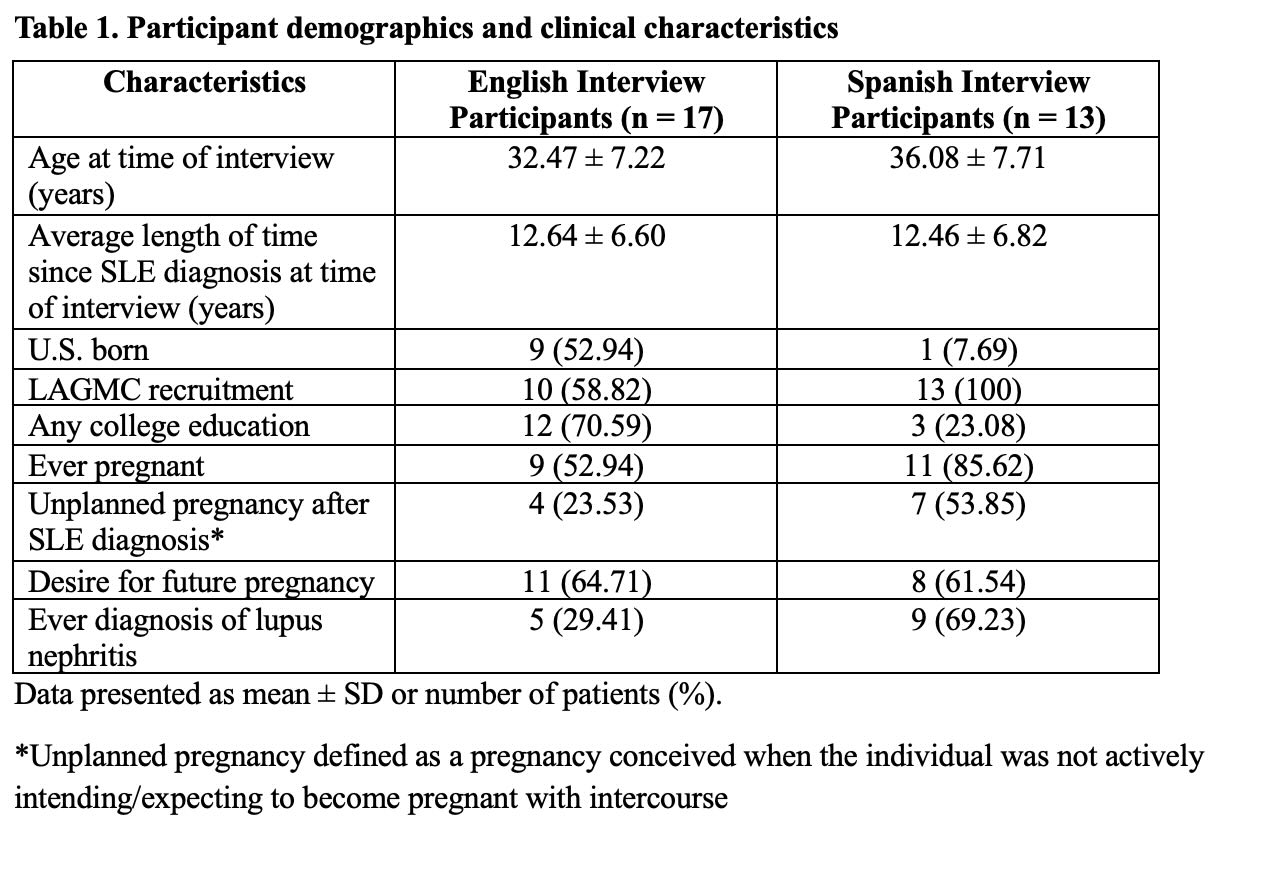Session Information
Date: Tuesday, October 28, 2025
Title: (2195–2226) Reproductive Issues in Rheumatic Disorders Posters
Session Type: Poster Session C
Session Time: 10:30AM-12:30PM
Background/Purpose: As systemic lupus erythematosus (SLE) often affects women of child-bearing age, understanding how this population makes reproductive health decisions is critical for well-rounded healthcare. Individuals often need more than just SLE medical optimization to feel comfortable with attempting pregnancy; many extrinsic, non-medical factors play a role. In this qualitative thematic analysis study, we explored the perspectives of female participants of Hispanic ethnicity diagnosed with SLE to understand sociocultural non-clinical factors that influence pregnancy planning and contraception use.
Methods: We conducted a qualitative study using semi-structured interviews with 30 Hispanic women diagnosed with SLE, recruited from Los Angeles General Medical Center and LupusLA. Eligible participants were aged 18–45, of Hispanic ethnicity, sexually active with a male partner or considering pregnancy within three years, and fluent in English or Spanish. Interviews were conducted virtually in the participant’s preferred language, recorded, and transcribed; Spanish interviews were translated into English. Interviews were conducted from June 2024 – March 2025. Sociocultural influences were collected via interview questions asking what non-clinical factors play a role in participants’ decision-making to attempt pregnancy and/or use contraception, with a focus on participants’ significant others, family, and sociocultural background. Data collection continued until thematic saturation was reached, and transcripts were analyzed using a grounded theory approach to identify sociocultural themes related to reproductive health decision-making. Coding was conducted by a multilingual, multidisciplinary team.
Results: A total of 17 English-speaking participants and 13 Spanish-speaking participants were interviewed (Table 1). Four sociocultural themes (Table 2) arose in both language groups which strongly influence patients’ views on pregnancy: 1) financial/career security; 2) support of their family (significant others and extended family support); 3) underlying cultural or religious beliefs (largely being against termination for unexpected pregnancy unless absolutely necessary, as well as divine control of the reproductive journey; 4) virtual media (a spectrum of both positive/negative influence). These themes emerged consistently among both English- and Spanish-speaking participants.
Conclusion: For women diagnosed with SLE, addressing reproductive health decision-making requires the clinician to approach the patient from a holistic perspective that considers the complex social and cultural factors influencing pregnancy decisions. While many patients with SLE should be timing pregnancy to be medically safe, our patient-reported qualitative data also demonstrates that pregnancy planning (or avoiding) is heavily influenced by non-medical extrinsic factors. Clinicians who acknowledge and address these factors may be better equipped to support patients in navigating pregnancy planning safely and confidently, promoting shared decision-making that aligns with patients’ lived experiences and values.
 Table 1. Participant demographics and clinical characteristics
Table 1. Participant demographics and clinical characteristics
.jpg) Table 2. Themes, subthemes, and representative quotes from grounded theory analysis on sociocultural influences for pregnancy planning
Table 2. Themes, subthemes, and representative quotes from grounded theory analysis on sociocultural influences for pregnancy planning
To cite this abstract in AMA style:
Ramirez A, Montes de Oca A, Delgado M, withers M, Wise L. Sociocultural Influences on Pregnancy Planning for Individuals Diagnosed with SLE in an Urban Hispanic Population: A Qualitative Study with Considerations for a Holistic Approach [abstract]. Arthritis Rheumatol. 2025; 77 (suppl 9). https://acrabstracts.org/abstract/sociocultural-influences-on-pregnancy-planning-for-individuals-diagnosed-with-sle-in-an-urban-hispanic-population-a-qualitative-study-with-considerations-for-a-holistic-approach/. Accessed .« Back to ACR Convergence 2025
ACR Meeting Abstracts - https://acrabstracts.org/abstract/sociocultural-influences-on-pregnancy-planning-for-individuals-diagnosed-with-sle-in-an-urban-hispanic-population-a-qualitative-study-with-considerations-for-a-holistic-approach/
